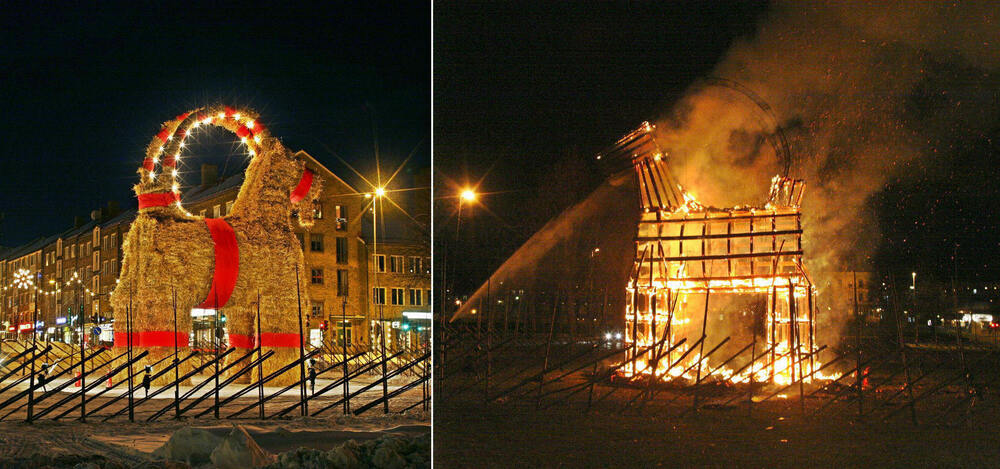Gavlebocken, we hardly knew ye. Truly.
Every year for Advent, the town of Gavle, Sweden, builds a giant Christmas goat out of straw. And every year, arsonists do their best to bring it down.
This time, despite high-tech cameras and two security guards, the goat didn't even last a full 24 hours.
The Gavlebocken was set up on Sunday afternoon. The Local reports that this year's statue cost about a quarter of a million dollars.
The town celebrated with a party — this year, it's the 50th anniversary of the Gavlebocken, so it was a birthday celebration as well as the standard-practice yuletime goat-statue festival.
"But by 11 p.m.," The Local writes, "it was engulfed in flames."
Oh no, such a short amount of time with you my friends. But I shall rise from the ashes and see you next year again!
— Gävlebocken (@Gavlebocken) November 27, 2016
There's a long tradition of people bringing down the Gavlebocken. And it's not just arson — any method of destruction seems to be acceptable.
"The goat has been demolished by vandals," Johan Adolfsson, the goat's spokesman (yes, it has a spokesman) told NPR in 2014. "It has been hit and run once. It has actually been stolen once. Don't ask me how they did it."
To be clear, the destruction of the goat is not supposed to be part of the ritual. (An American tourist who was confused on this point burned the 2001 Gavlebocken and made no effort to flee, The Local reports. The man told police his Swedish friends had convinced him burning was a perfectly legal tradition. He served more than two weeks in jail and was fined some $10,000.)

People look at fireworks during the inauguration of the traditional Gavle Goat on Nov. 29, 2015, in Gavle, Sweden.
And Adolfsson explained that they have tried — really, really tried — to keep the Gavlebocken in one piece.
Guards? Bribed.
Cameras? Hacked.
Fences? The arsonists came with flaming arrows.
In the 50 years that the Gavlebocken has been built, it's been destroyed 35 times, the BBC reports.
"Are we stubborn, or are we stupid?" Adolffson told NPR in 2014. "I don't know, but we like the goat."
In 2014, the goat survived — partly thanks to moving the local taxi stands closer to the statue, to keep more eyes on the goat, The Local reports. Four would-be arsons were stopped before they reached the goat.
In 2015, the goat was torched, but not until after Dec. 25 had already arrived — which, for the Gavlebocken, is nearly as impressive as getting off unburnt.

A composite photo of the Christmas goat shows the before and after it was torched by vandals in Gavle, Sweden, on Dec. 21, 2004.
This year, well ... The Local has more on what happened:
"In September, local politicians said they would try to have a 'goat guarantee' that it would survive its first weekend of the 2016 festive season. A number of high-tech security cameras were bought to try and protect it, yet they were unable to detect the goat burner.
"Organizers said that the culprit managed to get past security when one of the two guards patrolling the area left briefly to go to the toilet, and the other one was on the other side of the goat.
"Police are looking for the perpetrator and have launched a preliminary investigation for inflicting gross damage."
The town considered rebuilding it before Christmas.
"We want the goat to live more than a few hours," goat spokesperson Maria Wallberg told The Local earlier this week. . "We're going to look into now if it is possible to quickly build a new goat and what it would cost."
But posts on the Gavle Facebook page suggest that they won't be remaking a full-size Gavlebocken in time for this year's holiday.
9(MDAxODcyMTgzMDEyMTgxMTY5NjYxN2I4OQ004))
300x250 Ad
300x250 Ad
